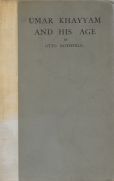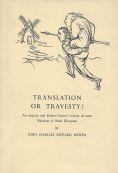The Rubáiyát of Omar Khayyám. I.B.H. Jewett.
In: Edward FitzGerald’s The Rubáiyat of Omar Khayyám. Ed. by H. Bloom. Philadelphia, Chelsea House, 2004. p. 21-58.
(From Edward FitzGerald. © 1977 by G.K. Hall & Co.)
Jewett pinpoints interesting moments in the correspondence between Fitzgerald and his mentor, Cowell, comparing their versions of the same Khayyam quatrain, thus illustrating “dramatically the difference between translation and creation”. The importance Fitzgerald attached to his earlier translation of Jami’s Salaman and Absal is also touched upon. Fitzgerald emphatic stipulation that Omar never be published without Salaman was apparently disregarded after his death. The article further gives a brief treatment of the problem of the Persian quatrains’ authenticity and of Khayyam’s possible authorship and possible mysticism.

